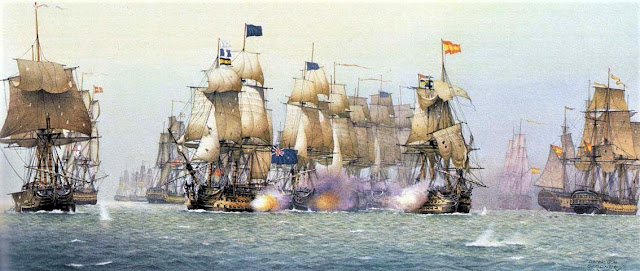Today is the 225th Anniversary of perhaps the most important naval battle certainly of the French Revolutionary War and perhaps second only to Trafalgar in its consequences for the Napoleonic War that followed.
This Saturday the club marked the occasion by hosting my collection of 1:700th model ships from the Warlord Games collection of models to help commemorate this battle in the 'Grand Manner'.
The result of the battle effectively reversed a war situation at sea that was definitely going against Great Britain following the fall of her key allies to France on land which saw the Mediterranean Sea surrendered to France and her allies, as the Mediterranean Squadron withdrew to Lisbon to effectively protect Gibraltar and be on hand to reinforce the Channel Squadron now facing a growing threat of invasion in either Ireland or the home country by French troops supported by the combined fleets of France, Spain and the Batavian Dutch Republic.
The Battle of Cape St Vincent effectively halted those plans with the defeat of the Spanish fleet destined to join the French fleet in Brest, and thus allowed the British to re-enter the Mediterranean Sea that would climax with Nelson's famous victory at the Battle of the Nile in the following year, ending French plans to sever British links to India through the Alexandrian corridor.
If you would like to know more about how our game progressed and other posts covering the campaign as a whole and the planning and organising of the game presented, then just follow the link to JJ's Wargames for a full AAR.
 |
| JJ's Wargames - Battle of Cape St Vincent, 14th February 1797, 225th Anniversary Game AAR |
If you would like to watch a ten minute compilation of pictures and video clips from our game illustrating how the models were being activated, fired and moved, using Kiss Me Hardy, then just click on the link below.
Cheers
JJ






I've been reading about the battle of the Nile, which people tend to call the most important naval battle of the revolutionary wars. Why do you go for St Vincent instead?
ReplyDeleteHi Paul,
DeleteFor the very reasons outlined here in the post, namely that up until the Battle of Cape St Vincent, Britain was losing the French Revolutionary War, with the exception of the Glorious First of June, Britain had been kicked out of Europe by French armies in the Netherlands, she had lost most of her European allies, now either allied to France or neutral, and the naval alliance between Spain, Holland and France, together with lost bases, had caused Britain to evacuate the Mediterranean to support her only remaining ally, Portugal, whilst threatening a joining up of all three enemy navies at Brest for an invasion of Ireland and mainland Britain.
The Battle of Cape St. Vincent in February 1797 effectively reversed the progress of the war, confining the Spanish in the main to its homeland ports, allowing Britain to re-enter the Mediterranean the following year, rocketing the career of the new Rear-Admiral, rather than Commodore, Nelson, in the wake of his success in the battle, whilst freeing up naval assets that enabled the final defeat of the French planned invasion of Ireland with the defeat of the Dutch at Camperdown in October 1797 and handing the initiative back to the Royal Navy.
The Nile was the icing on the cake as far as this change in the course of the war, but without Cape St Vincent, the Nile may well never have happened, as Britain may not have got back into the Mediterranean or have been forced on to the back foot trying to defeat an Irish or mainland invasion.
I tend to agree with those that have argued, the naval war turned irrevocably in 1797 in the French Revolutionary War, just as it did in 1805 in the Napoleonic War and as with Trafalgar, Strachan's victory at Cape Ortegal in November 1805 and arguably Duckworths victory at the Battle of San Domingo and the Atlantic Campaign of 1806 were the icing on the cake to Nelson's pivotal victory, although, of course, Trafalgar was far more decisive than Cape St Vincent, but I would argue the latter certainly paved the way for the former.
JJ